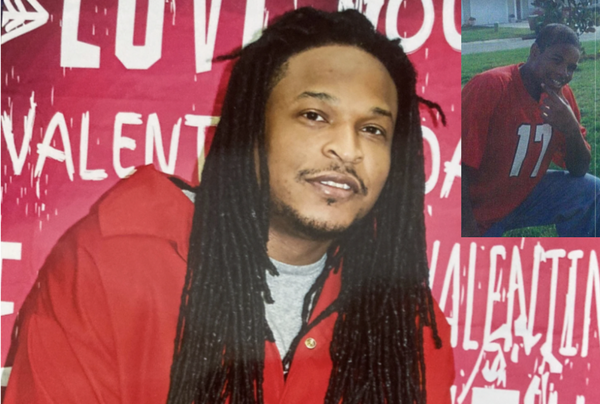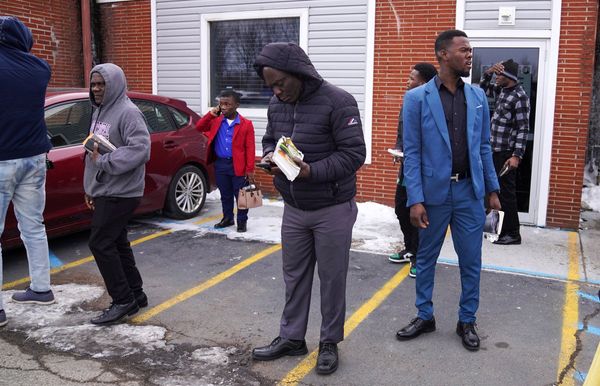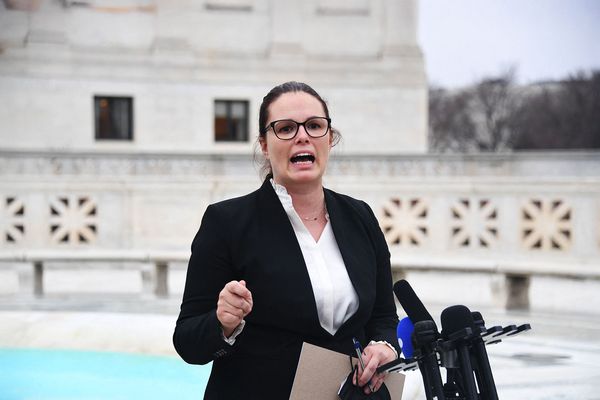
“Let the healing begin,” says Sam Herlihy the moment I turn on my tape recorder. He’s joking, but not entirely. In December, Herlihy’s band Hope of the States will reform for a series of shows – the first time they have played together live for more than 18 years. The gigs, along with a new EP, mark 20 years since the group’s debut album The Lost Riots bucked the early-00s trend for short, spiky indie songs in favour of epic soundscapes that incorporated military drums, Morricone-esque strings and portentous lyrics about the perils of nationalism. When Hope of the States split in 2006, shortly after playing the Reading and Leeds festival, Herlihy declared that the band were cursed. Certainly, their short tenure had more than its share of misfortune and tragedy.
Herlihy was the person who walked into the studio late one night, during the recording of The Lost Riots, to find his friend and bandmate Jimmi Lawrence had killed himself. These days, such a terrible event would involve interventions – therapy, a lengthy career pause. But three weeks after Lawrence died, Hope of the States were back in the studio, finishing their album before touring the world.
“I don’t blame the label,” says Herlihy today over a pint of Guinness. We are in a beer garden in Margate, Kent, where the band are recording four new songs. “It was a different time. People didn’t talk about mental health. And going back into the studio was what we said we wanted.”
In one sense, at least on the surface, Hope of the States managed to keep going after Lawrence’s death. They finished The Lost Riots and recorded a follow-up called Left, as well as playing gigs in the US and Japan. But in another sense, they never really recovered. When Herlihy recounts his time in the band it reads like a series of stressful incidents. He remembers being about to go on stage at Glastonbury festival and realising the military jackets that the band always wore during performances had been locked in their tour van. Their tour manager had done a runner with their money and they had to smash the windows to get inside. He recalls guitar strings constantly breaking while recording Later … With Jools Holland, and Top of the Pops making them play live on unfamiliar instruments (“We were drunk … It was a disaster”). There were temper tantrums and meltdowns whenever things went wrong. “God, I did not deal with that stuff well,” he says. “But I was grieving, I was a kid … I shouldn’t have behaved like that, but it felt like it all mattered so much.”
It’s no wonder, then, that Herlihy had doubts about bringing Hope of the States back. But when his wife pointed out the 20th anniversary date, and music industry friends expressed enthusiasm for a reunion, he reached out and found the band were keen to make it happen. Herlihy says he “felt like I was going to have a panic attack” when he walked back into a rehearsal room. Then they staggered through some old songs and he realised the magic was still there. “It’s not quite muscle memory but emotional memory,” he says. “You suddenly feel the same things you felt then, even though you’re 20 years older.” Adding to this emotional wallop is the fact the producer of their new EP is Jolyon Thomas, son of the late Ken Thomas who produced The Lost Riots.
Sonically similar to the grandeur of their debut album (one song even reaches the 12-minute mark), the new songs try to capture that original youthful passion when everything – especially music and film – felt vitally important. Old friends from high school are name-checked; old times drinking stolen booze in a park are glorified.
I first met Herlihy and his bandmates back when they were releasing early singles such as Black Dollar Bills and Enemies/Friends. They were great company and talked a good game. “I think I was a cocky gobshite, really,” laughs Herlihy. But they also seemed hyper aware of being outsiders in a scene that was spawning the more commercial likes of Franz Ferdinand and the Killers. How could they compete? Their live shows involved doomy video projections and their songs were inspired by Godspeed You! Black Emperor, Mogwai and Naomi Klein’s No Logo. Somewhat implausibly by today’s standards, Sony offered them a £1m record deal anyway – which they enjoyed spending.
“Our budget for promo CDs would be a grand,” says Herlihy. “But we’d be like: ‘No, we want to do them in hand-sewn sleeves made out of flags that are half burnt!’ So a bunch of Sony interns would be sewing these flags and burning them with little kitchen flamers and it would cost 10 times the budget. But we’d be like: ‘Wicked! Look at these things, they’re cool!’”
Over time, the band drifted away from wild creative whims. Things became a slog, and they started to question why they were still doing it. When the band were offered the opportunity to record a third album, they declined. It was no longer fun. Partly, says Herlihy, because of the way they were treated by other bands following Lawrence’s death. “We wanted to have drinks with them at festivals and hang out,” he says. “But it was like we were damaged goods. Everyone’s looking for you to be some kind of grief-stricken doomlord, but I didn’t feel like I was.”
The complexity of grief was starting to entangle the band. They were devastated, of course, but they also realised they were living out their dreams. “It was difficult to put across your best side because then I would feel a bit guilty. I felt like people expected me to just want to sit there and cry. The whole situation was messy and horrible.”
It was after the band had split that things caught up with Herlihy. For more than a decade he was haunted by comments from friends of Lawrence who had said that he was to blame – there seemed to be an implication that, as the leader of the band, he was the one responsible for Lawrence’s welfare. “I was the last person to see him and I was the one who found him,” he says. “So you just think, oh, this is my fault.” It was only when he eventually saw a therapist that he realised he was suffering from PTSD. He began work resolving the conflicting anger and guilt he still had around Lawrence’s death. These days he remembers his friend from a much healthier perspective.
“I think about him now as a mate more than anything else. The way it happens is, ‘Oh, he’d have loved that television show’, or ‘I wish he could hear that album.’ Because we weren’t just in a band together – we got drunk together, we hung out and we talked about the Pogues. So yeah, it would be cool to have him on stage playing guitar with us, but that’s not the main way I think about Jimmi.”
Before reaching out to a therapist, Herlihy’s life had taken a rather bleak turn. He had assumed he would just start a new band after Hope of the States and get another record deal. “Then, when that didn’t happen, I thought: ‘Oh shit.’” He found a job in Starbucks, and still winces when remembering the encounters he had there.
“Maybe once every couple of weeks, you’d hand somebody their coffee and they’d do a double take. And I’d be like: oh God, I know what’s coming. They’d have this sort of disappointment on their face and they’d say: ‘Aren’t you Sam from …’ and I’d say: ‘Yeah, you know, bills to pay!’ It was quite brutal. Looking back it’s like: why the fuck didn’t I just take an office job? My wife says I probably did it as some sort of self-flagellatory thing.”
Herlihy bounced back, though, opening the fine dining restaurant Pidgin in Hackney, east London, along with a bunch of other eateries. Other members of the band also seem to have gone into various foodie jobs – from restaurants and microbreweries to natural wine bars in Copenhagen. Herlihy has three kids; his eldest is now around the age he was when his band first took off. He’s thrilled that they will get a chance to see the band perform.
And this time if any strings break or amps blow up there will be no tantrums. “Hopefully not. I’m a grown man now,” he laughs. “There’s no reason to do it unless it’s joyful. The minute it isn’t, then I’ll leg it.”
These are the words of a happier, more stable Herlihy. So is he really ready to risk unleashing the band’s curse again? After our interview ends, I stand to leave and realise that a bottle of water has leaked into my bag, soaking the contents, which includes a battery pack.
Sam clocks it and, with a grin, imagines a future conversation he might be having. “Yeah, well we were all set to get this piece published in the Guardian … but the journalist electrocuted himself on the way home so it never happened.”
Well, if you’re reading this then maybe the curse has been lifted.
Hope of the States release Long Waits in A&E digitally on 1 November. The vinyl edition will be available as the band tour 4 to 7 December; tour starts Manchester.
In the UK and Ireland, Samaritans can be contacted on freephone 116 123, or email jo@samaritans.org or jo@samaritans.ie. In the US, you can call or text the National Suicide Prevention Lifeline on 988, chat on 988lifeline.org, or text HOME to 741741 to connect with a crisis counsellor. In Australia, the crisis support service Lifeline is 13 11 14. Other international helplines can be found at befrienders.org







